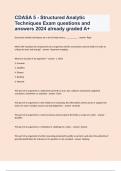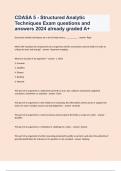Cdasa 5 - Study guides, Class notes & Summaries
Looking for the best study guides, study notes and summaries about Cdasa 5? On this page you'll find 125 study documents about Cdasa 5.
Page 2 out of 125 results
Sort by
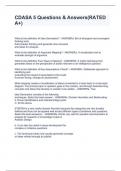
-
CDASA 5 Questions & Answers(RATED A+)
- Exam (elaborations) • 2 pages • 2024
- Available in package deal
-
- $10.49
- + learn more
What is the definition of Idea Generation? - ANSWERd. Bin of divergent and convergent thinking tools that broaden thinking and generate new concepts and ideas for analysis. What is the definition of Argument Mapping? - ANSWERa. A visualization tool to evaluate strength of argument. What is the definition Four Ways of Seeing? - ANSWERb. A matrix technique that generates ideas on the perspective of actors relevant to an intelligence question. What is the definition of Key Assumptions Ch...
CDASA 5 - Structured Analytic Techniques Exam questions and answers 2024 already graded A+
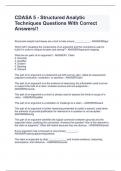
-
CDASA 5 - Structured Analytic Techniques Questions With Correct Answers!!
- Exam (elaborations) • 3 pages • 2024
- Available in package deal
-
- $9.99
- + learn more
Structured analytic techniques are a tool to help ensure ___________ - ANSWERRigor Which SAT visualizes the components of an argument and the connections used to build it in order to critique its basis and strengt? - ANSWERArgument mapping What are six parts of an argument? - ANSWER1. Claim 2. Grounds 3. Qualifier 4. Dissent 5. Backing 6. Warrant This part of an argument is a statement put forth as true; also, called an assessment, judgment conclusion, contention, or assertion...
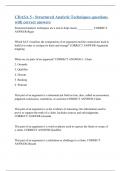
-
CDASA 5 - Structured Analytic Techniques questions with correct answers
- Exam (elaborations) • 5 pages • 2023
- Available in package deal
-
- $14.49
- + learn more
Structured analytic techniques are a tool to help ensure ___________ CORRECT ANSWER-Rigor Which SAT visualizes the components of an argument and the connections used to build it in order to critique its basis and strengt? CORRECT ANSWER-Argument mapping What are six parts of an argument? CORRECT ANSWER-1. Claim 2. Grounds 3. Qualifier 4. Dissent 5. Backing 6. Warrant This part of an argument is a statement put forth as true; also, called an assessment, judgment conclusion, con...
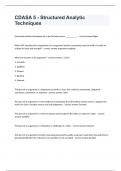
-
CDASA 5 - Structured Analytic Techniques Question and answers already passed 2024
- Exam (elaborations) • 4 pages • 2024
- Available in package deal
-
- $14.49
- + learn more
CDASA 5 - Structured Analytic Techniques Question and answers already passed 2024 Structured analytic techniques are a tool to help ensure ___________ - correct answer Rigor Which SAT visualizes the components of an argument and the connections used to build it in order to critique its basis and strength? - correct answer Argument mapping What are six parts of an argument? - correct answer 1. Claim 2. Grounds 3. Qualifier 4. Dissent 5. Backing 6. Warrant This part of an argume...
CDASA 5 - Structured Analytic Techniques Exam questions and answers 2024 already graded A+
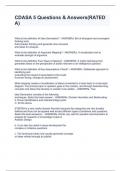
-
CDASA 5 Questions & Answers(RATED A)
- Exam (elaborations) • 2 pages • 2024
- Available in package deal
-
- $15.49
- + learn more
What is the definition of Idea Generation? - ANSWERd. Bin of divergent and convergent thinking tools that broaden thinking and generate new concepts and ideas for analysis. What is the definition of Argument Mapping? - ANSWERa. A visualization tool to evaluate strength of argument. What is the definition Four Ways of Seeing? - ANSWERb. A matrix technique that generates ideas on the perspective of actors relevant to an intelligence question. What is the definition of Key Assumptions Ch...
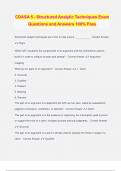
-
CDASA 5 - Structured Analytic Techniques Exam Questions and Answers 100% Pass
- Exam (elaborations) • 5 pages • 2024
- Available in package deal
-
- $11.49
- + learn more
CDASA 5 - Structured Analytic Techniques Exam Questions and Answers 100% Pass Structured analytic techniques are a tool to help ensure ___________ - Correct Answer ️️ -Rigor Which SAT visualizes the components of an argument and the connections used to build it in order to critique its basis and strengt? - Correct Answer ️️ -Argument mapping What are six parts of an argument? - Correct Answer ️️ -1. Claim 2. Grounds 3. Qualifier 4. Dissent 5. Backing 6. Warrant This part...
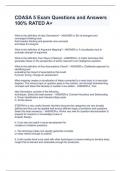
-
CDASA 5 Exam Questions and Answers 100% RATED A+
- Exam (elaborations) • 2 pages • 2024
- Available in package deal
-
- $8.49
- + learn more
What is the definition of Idea Generation? - ANSWER-d. Bin of divergent and convergent thinking tools that broaden thinking and generate new concepts and ideas for analysis. What is the definition of Argument Mapping? - ANSWER-a. A visualization tool to evaluate strength of argument. What is the definition Four Ways of Seeing? - ANSWER-b. A matrix technique that generates ideas on the perspective of actors relevant to an intelligence question. What is the definition of Key Assumptions...
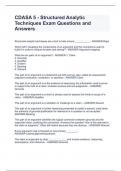
-
CDASA 5 - Structured Analytic Techniques Exam Questions and Answers
- Exam (elaborations) • 3 pages • 2024
- Available in package deal
-
- $9.99
- + learn more
Structured analytic techniques are a tool to help ensure ___________ - ANSWER-Rigor Which SAT visualizes the components of an argument and the connections used to build it in order to critique its basis and strengt? - ANSWER-Argument mapping What are six parts of an argument? - ANSWER-1. Claim 2. Grounds 3. Qualifier 4. Dissent 5. Backing 6. Warrant This part of an argument is a statement put forth as true; also, called an assessment, judgment conclusion, contention, or assert...

Did you know that on average a seller on Stuvia earns $82 per month selling study resources? Hmm, hint, hint. Discover all about earning on Stuvia

